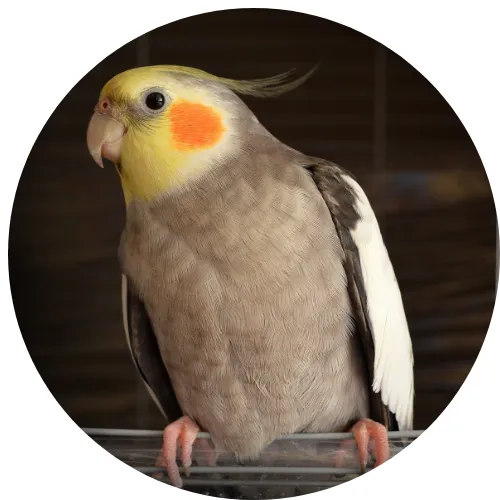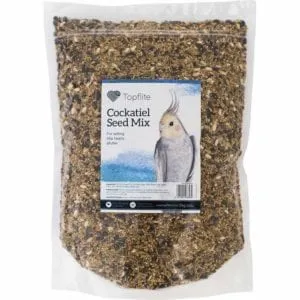Providing the right nutrition is paramount for the health and longevity of your beloved cockatiel. As our understanding of avian diets continues to evolve through increased research and awareness, it’s clear that a balanced diet of carbohydrates, proteins, fats, vitamins, minerals, and water is crucial for all birds, including cockatiels. Unfortunately, nutrition is often the most overlooked aspect of pet bird ownership, leading to a host of preventable health problems. Continuously striving to improve your bird’s diet is key to helping them not just survive, but truly thrive and flourish. Your cockatiel’s overall well-being is directly linked to the quality of its diet. For a more in-depth look at cockatiel nutrition, consider exploring a dedicated resource on cockatiel diet and nutrition.
Understanding Your Cockatiel’s Natural Diet
In their natural habitat, cockatiels enjoy a varied diet consisting of various grass and other seeds, fruits, and berries. They are opportunistic feeders, even known to forage in farmers’ crops. However, this natural diet differs significantly from what is often provided in captivity. Without a diverse range of food sources, captive cockatiels are prone to diet-related issues such as obesity, feather picking, egg binding, weakness, and paralysis. Maintaining a consistently well-balanced diet is essential to prevent these common ailments and ensure your bird remains healthy and active.
The Problem with Seed-Only Diets
Seeds are widely available, store well, and are convenient, making them a popular choice for many bird owners. While cockatiels do consume seeds in the wild, they naturally eat a much broader variety as different plants come into season. An exclusive seed diet, particularly common commercial mixes, tends to be high in fat and offers an imbalanced array of nutrients. This nutritional deficiency can lead to significant health issues and potentially shorten your cockatiel’s lifespan.
Commercial seed mixes might contain several types of seeds and nuts, but a common problem arises when a large quantity is offered: birds often selectively eat only their one or two “favorite” types. Millet and sunflower seeds, frequently preferred by cockatiels, are particularly high in fat and critically deficient in essential nutrients like calcium and vitamin A, exacerbating malnutrition. To encourage a more varied intake, offer a smaller amount of a good quality seed mix. As a general rule, offering less encourages them to eat better and more diversely. Most cockatiels thrive on 1.5 to 2 level teaspoons of seeds per bird, per day, served in a shallow dish. If multiple cockatiels share a cage, use separate dishes to ensure all birds, especially those lower in the “pecking order,” have adequate access to food. Seeds should constitute only a small portion of a truly balanced diet.
The Ideal Choice: Formulated (Pelleted) Diets
For optimal nutrition, formulated diets, such as pellets, crumbles, and hand-feeding mashes, are specifically designed to meet all of your bird’s dietary needs. These specialized foods come in different formulations suitable for various life stages and for managing specific diseases. Hand-raised cockatiel babies are generally the easiest to introduce to a pelleted diet. Pellets represent the ideal diet for cockatiels, and owners are strongly encouraged to slowly transition “seed-eating” birds onto a pelleted regimen.
Converting Your Bird to a Pelleted Diet
Converting seed-eating birds, often referred to as “seed-aholics,” to a formulated diet can be challenging, especially with mature cockatiels. Pellets, being a new item, are not immediately recognized as food. The most effective approach is to slowly wean your bird off seeds over several weeks while making pellets constantly available in a separate dish. Some owners find success by mixing a reduced amount of seeds with pellets to aid acceptance, but be aware that birds are unlikely to accidentally eat a pellet; they will deliberately pick around them. This conversion process can take days, weeks, or even months. Interestingly, cockatiels kept together in a flock may be more inclined to convert from seeds. It is crucial to NEVER entirely withdraw seeds without first being absolutely certain that your bird is consistently eating the formulated food along with some fruits and vegetables. Birds can be stubborn, but with patience and persistence, they can be trained. Remember, you are training the bird; do not let the bird train you. Close monitoring during this transition is vital. If you encounter any problems with this adaptation or observe any health concerns, always consult your veterinarian.
 A healthy cockatiel perched, with vibrant feathers and a keen gaze, symbolizing proper care.
A healthy cockatiel perched, with vibrant feathers and a keen gaze, symbolizing proper care.
Essential Fresh Foods: Fruits, Vegetables, and Greens
A general guideline for feeding your bird is that any wholesome, nutritious food you and your family consume, your bird can also eat. Fresh fruits, vegetables, and greens should make up approximately 20-25% of your cockatiel’s daily diet. However, be mindful of their nutritional value; pale vegetables with high water content, such as iceberg lettuce or celery, offer very little. Avocado is also potentially toxic to birds and should be strictly avoided.
All fruits and vegetables must be thoroughly washed to remove any chemicals before being cut into manageable pieces appropriate for your bird’s size. It is not necessary to remove the skin. These fresh foods should always be offered in a separate dish. To encourage your bird to eat fruits and vegetables, treat them much like a small child: offer a wide variety of food items daily and never give up trying. Consistency and diverse offerings are key to expanding their palate.
Hydration and Other Dietary Considerations
Fresh, clean water must be available to your cockatiel at all times. Water dishes, especially tube or gravity water containers, need to be cleaned thoroughly every single day to prevent bacterial growth and ensure hygiene. This simple step is critical for your bird’s health.
“People” Food for Cockatiels
When considering “people” food, follow the general rule of wholesome, nutritious options and use common sense. Some birds may occasionally enjoy a small amount of lean meat, cheese, or egg. Dairy products should be given in moderation. It is unequivocally sensible to avoid “junk food,” sugary treats, and alcoholic beverages, as these can be highly detrimental to a bird’s delicate system.
Special Dietary Needs Throughout Life
Cockatiels may have specific dietary requirements during different stages of their lives or under certain conditions. Extremely young birds, those experiencing stress or injury, or females laying eggs or raising young, often have special nutritional needs. Always consult your veterinarian to discuss appropriate dietary adjustments for these situations to ensure they receive the necessary support.
Do I Need to Use a Vitamin-Mineral Mixture?
If your cockatiel is consistently on an excellent, balanced diet, the need for extra vitamins, minerals, or amino acids is a common question. While much is written about supplementation, powdered supplements are generally considered more stable. These products are best mixed with water or, preferably, applied directly onto moist food. Placing powders on seeds or dried foods offers little value, as the powder will simply fall to the bottom of the dish, becoming inaccessible to the bird. Some experts suggest that a bird consuming 75-80% of its diet as pelleted or formulated food may not require additional supplements. However, specific vitamins or minerals might become more important at various times, such as calcium supplementation during egg-laying. Your veterinarian is the best resource to assess your bird’s diet and its particular needs.
 A small pile of different seeds, illustrating the variety often found in commercial bird mixes and the importance of balanced nutrition.
A small pile of different seeds, illustrating the variety often found in commercial bird mixes and the importance of balanced nutrition.
Does My Bird Need Gravel or Grit?
In the wild, birds naturally consume small stones, gravel, or grit to aid in the mechanical digestion of seeds. In captivity, especially with formulated diets, the necessity of grit is a subject of debate. Offering a small amount in a separate dish allows your bird to decide if it needs or wants it. Crucially, never place gravel on the bottom of the cage, as this forces the bird to eat from what is essentially its “toilet,” the dirtiest part of the cage. Gravel containing charcoal is reported to absorb certain vitamins from the digestive tract, rendering them unavailable to the bird. White oyster shell may be present in some gravel mixes. Be aware that some sick birds may consume inappropriate amounts of grit. If you observe irregular or excessive grit consumption, consult your veterinarian immediately.
Key Daily Tips for Cockatiel Feeding:
- Always monitor the amount of food eaten daily by each bird.
- Offer fresh water every day.
- Offer fresh food every day.
- Offer fresh fruits and vegetables every day.
- Clean all food and water dishes daily.
- A “no” to a food item one day does not mean “no” forever – keep trying!
Some Suggested Food Items for Cockatiels:
| Apple | Cherries (not the pit) | Pear |
|---|---|---|
| Apricots | Chinese vegetables | Peas |
| Asparagus | (i.e., bok choy) | Peppers |
| Banana | Coconut | Pineapple |
| Beans (cooked) | Corn | Plum |
| Chickpea | Cucumber | Pomegranate |
| Kidney | Dandelion leaves | Potato |
| Lentils | Endive | Pumpkin |
| Lima | Fig | Rappini |
| Mung | Grapes | Raspberry |
| Navy | Grapefruit | Rice (brown) |
| Soy | Kale | Romaine lettuce |
| Beet | Kiwi | Spinach |
| Blueberry | Melons | Sprouted seeds |
| Broccoli | Mango | Squash |
| Brussel Sprouts | Nectarines | Strawberry |
| Cabbage | Orange | Sweet potato |
| Cantaloupe | Papaya | Tomato |
| Carrot | Parsnip | Zucchini |
| Carrot tops | Peaches |
In conclusion, providing an optimal diet for your cockatiel requires diligence, a willingness to adapt, and a commitment to their well-being. Moving beyond a seed-exclusive diet to incorporate high-quality pellets and a diverse range of fresh fruits and vegetables is the most impactful step you can take. Remember to provide constant access to clean water and understand that your bird’s nutritional needs may change over time. Always prioritize consulting your veterinarian for personalized advice, especially during dietary transitions or if you have any health concerns. By following these guidelines, you can ensure your cockatiel enjoys a long, healthy, and vibrant life. For more detailed information and to explore other aspects of pet care, we encourage you to browse other valuable articles on our website!
References:
- VCA Hospitals: Cockatiels – Feeding.
